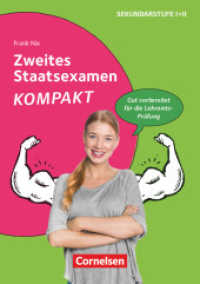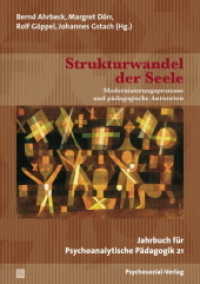Full Description
On 9 August 1974, Richard Nixon resigned to avoid impeachment; on 29 April 1975, the United States scuttled from their Embassy in Saigon - optics that were interpreted as defeats for the 'International Right'. Yet in 1975, Margaret Thatcher became leader of the Conservative Party; and in 1976 Ronald Reagan almost unseated a sitting Republican Party President. Pivotal to the 'turn to the Right' was Friedrich 'von' Hayek's 1974 Nobel Prize for Economic Science - awarded for having used Austrian Business Cycle Theory to predict the Great Depression: 'For him it is not a matter of a simple defence of a liberal system of society as may sometimes appear from the popularized versions of his thinking.'
The evidence suggests that Hayek's fraudulent assertion was uncovered at the University of Chicago in the early 1930s - but not reported. The most likely explanation is self-censorship - for reasons of ideological correctness, fund raising and residual deference to the Second Estate. Four indirect tests suggest that 'free' market economists have - in other instances and presumably for fund-raising motives - suppressed embarrassing 'knowledge': which suggests that they were perfectly capable of suppressing 'knowledge' about Hayek's non-prediction of the Great Depression.
With respect to the Nobel Prize and thus his ability to reach a wider audience, Hayek was fortune in having two loyal 'intermediaries': Lionel Robbins and Fritz Machlup who were - and probably felt themselves to be - 'socially' inferior to 'von' Hayek.
Contents
Part I: Hayek's Luck.- 1. 'I have been lucky in this game.' -Robert Leeson.- 2. The Tobacco, Obesity and Fossil Fuel Lobby - 'As Happy as Hell.' -Robert Leeson.- 3. 1-15: Residual reverence towards the Second Estate. -Robert Leeson.- 4. 16-20: Loyal 'intermediaries.' -Robert Leeson.- 5. 21-24: 'I desire to preserve correct relations in public.' Robert Leeson.- 6. 25: Suppression, the dogs that didn't bark, and the emerging Chicago School of Economics. -Robert Leeson.- 7. 31 Conclusions about Hayek's Nineteen Thirty One 'Prediction.' -Robert Leeson.- Part II: Myrdal and Machlup.- 8. The Saving/Investment Explanation of Business Cycles in Hayek and Myrdal: Similarities and Differences. -Adrián de León Arias.- 9. Machlup and Hayek: Filation of Ideas and Ambition. Carol M. Connell.- Part III: The Chicago School of Economics.- 10. Friedman and Hayek's Converging Ideas on Freedom and the State. Birsen Filip.- 11. Chicago Economics in the Making, 1926-1940: A Further Look at United States Interwar Pluralism. Luca Fiorito and Sebastiano Nerozzi.








